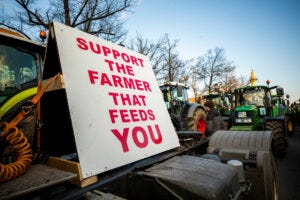No Farmers, No Food, No Future
Rationing, population control and reduced life expectancy beckon
All over the world, everywhere you look.
And now bugs. They are actually serious about bugs, and when I say ‘they’ I mean the government. Justin Trudeau, the most hated man in Canada, and the most hated prime minister in history granted millions to yet another bug factory not too long ago. This venture is so unpopular, some wit created an app that scans a food product to see whether bugs are being used.
Bugs and chemical meats are meant to replace meat, dairy and eventually, grains and vegetables. Like the vaccines, given the recent history of government institutions meant to assure safety, there is substantial doubt as to safety or efficacy, but never mind. It is part of the great green future, where we will live in concrete bunkers piled on top of each other and eat meat paste and crickets. A contractor friend building four badly needed high rises in the near-by capital city, claims there is so much green regulation wicking away money, they are limited to low-ceilinged bunkers, with tiny windows.
Not a bad idea.
This is all allegedly to lower the methane released by humans, meat birds, pork and cattle, to reduce the use of nitrogen in fertilizers. Since provisions of the Green New Deal were included in the “Inflation Reduction Act,” the Biden administration has gone full bore into regulatory rule-making. Rule-making is surreptitiously powerful and generally goes ignored by any media, since few journalists have done time in the real world of actual production of actual goods that people need to eat.
But that rule-making is now methodically shuttering independent farmer after rancher after farmer. Ranches that have fed people for a century or more are having their herds reduced from six hundred head of cattle to one hundred, without any ability to discuss or work with the Bureau of Land Management official who is ruining them. A proposed new rule gives Bureau of Land Management employees even more power, without any legislative oversight.
Legislators, national, state-wide and local, cannot keep up with the number of food-producing businesses being destroyed. The tactics are fiendish and destructive. The biggest dam removal in history is about to happen in the Klamath, despite the fact that the second biggest dam removal did not bring back the Coho salmon. There is no rigour within the cadres destroying America. Their science is rubbish, the fruits of their work, demonic.
At the G20 two weeks ago in New Delhi, the conference issued a joint statement endorsing the 30 percent goal “to achieve land degradation neutrality.” Farming is now considered land degradation. Last week, Biden announced the creation of a “Climate Corps” styled after the New Deal’s Work Projects Administration, which will employ a corps of formerly unemployed fanatics patrolling any productive operation for "climate crimes." This is so dystopian it is hard to believe. But it’s true.
The usual suspects.
The Epoch Times has just released a film called, No Farmers, No Food. An hour of searing first-class reporting showed just how far along the 2030 food rules have progressed. The Epoch team dug into the stories of the Dutch farmers, the Sri Lankan disaster where the withdrawal of fertilizer meant starvation, and the literal crimes taking place out in the heartlands and rangelands of America.
One of the constants is farmer suicide, in Holland, in Sri Lanka, in America. General Secretary Antonio Guterres, head of the U.N., has complained that the world organization is only 15 percent of the way toward its Sustainable Development Goals and requires a Global Rescue Plan. This is almost certainly a lie. Nothing the U.N. says is actual truth, it’s all wordsmithed propaganda. The stupidity of it has already nearly starved an entire country, until Sri Lankans rose up, stormed the Presidential Palace and swam in the deposed rascal’s pool.
Climatistas were willing to starve millions people of color in Sri Lanka to reach their goals. Which country will they attack next? Nothing has been tested, there are no analyses of what might happen if an entire country of subsistence farmers just emerging from cyclical famine, goes organic. They do not know what the effects of meat paste or crickets are on human beings. They do not even know if their ideas will reduce carbon. There have been no demonstrated, trustworthy studies showing meat paste is superior and shocking studies that show it reduces health. They won’t starve us in the West, they will just withdraw real food by making it so expensive, we give up and start eating crickets and chemical meat. By increments. So we don’t really notice.
The bug- and meat-paste factories are in every country now, and investors get massive tax breaks and subsidy for investing in them. As John Kerry said last year, “Wherever we run into a problem it is always solved by money, money, money.” By which he means that when consumers reject fake meat, as they are doing now, they just switch their tactics toward buying out real meat producers and thus reducing supply while increasing prices.
When you take land out of production, it runs to wasteland. Like the shuttered forests of the American Northwest, vegetation runs riot, invasive species climb trees, creating fire ladders. Trees grow so close together they desiccate the soil, reducing the water supply. Birds and other species leave. And finally the forests explode in fire. Rangeland without cattle degrades, farmland without stewardship runs to invasives and the soil is denatured.
In the annals of Man's mistakes, this one has to be the worst of all. It will destroy the land, and poison us. And perhaps that is the point.
Twice a month I report on the latest moronic advances crafted by the environmental movement and its agents, the WEF and the UN’s Sustainable Development’s Goals.I may not be the world’s top expert on this, but I’m up there. I’ve spent the last twenty years watching them destroy the region I live in, impoverish and immiserate the bottom 50%, stripping them of hope and agency. My book and policy papers can be accessed here and here. On this brief, I am a Senior Fellow at the Frontier Center for Public Policy.
Elizabeth Nickson was trained as a reporter at the London bureau of Time Magazine. She became European Bureau Chief of LIFE magazine in its last years of monthly publication, and during that time, acquired the rights to Nelson Mandela’s memoir before he was released from Robben Island. She went on to write for Harper’s Magazine, the Guardian, the Observer, the Independent, the Sunday Telegraph, the Sunday Times Magazine, the Telegraph, the Globe and Mail and the National Post. Her first book The Monkey Puzzle Tree was an investigation of the CIA MKULTRA mind control program and was published by Bloomsbury and Knopf Canada. Her next book, Eco-Fascists, How Radical Environmentalists Are Destroying Our Natural Heritage, was a look at how environmentalism, badly practiced, is destroying the rural economy and rural culture in the U.S. and all over the world. It was published by Adam Bellow at Harper Collins US. You can subscribe to her Substack at elizabethnickson.substack.com/
THE PIPELINE is dedicated to exposing the Environmentalist Movement's undermining of freedom and prosperity across the Anglosphere and beyond.






God help us.
This is my first comment here.
Firstly, I love the title of the blog/publication/whatever-subtack-calls-em.
I am not a farmer, but have had a few generations of my family in that field - but who had to quit it either because of financial issues or because later generations moved to "less intensive / risky / more stable" fields of office work. But those generations did tell me about some of the both richness and the labour involved in farm work - of eating fresh produce, having un'pasteur'ised milk and so on. India is now in different stages of corporatised farming, mind you.
The opening picture caught my eye, and while one is sympathetic and understanding - if not in direct agreement with the idea/fact that farmers are required for us to survive, the opening picture is a study in contrast. The picture is from a protest where farmers protested against having the option of corporate-contracted farming.
Some background:
The opening picture is from the made-for-western-press "farmers protests" in Northern India, spefically one section of Rich - and Uniquely mollycoddled set of farmers in Northern India. Their access to the Capital of India gives them more eyeballs than practically 90% of Indian farmers - who don't drive around in SUVs from Mercedes / BMW / Lexus etc.,. (Think of people getting close to the DC or NY tri-state area getting privileged coverage in the US)
The average farmer in India is usually privileged to earn about 3000$ a year - average median income in India. These SUVs referenced usually cost double what they do overseas - whether in US or Europe - primarily because they aren't built in India but imported. So think closer to 80,000$ or more likely 100,000$. These privileged farmers protested because their earnings would be impacted - by competitive farming elsewhere in the country.
There are a ton of farmers elsewhere in India who are unable to have a choice because these farmers hold the discussion hostage - by virtue of their ability to bring Delhi - the capital of India to halt. Unlike Laundrytown, DC, the Indian capital is actually a densely populated Economic & Political Powerhouse - and these farmers attempted to shut its economy.
Note that no one outside that small periphery actually cared to protest - and Indian farmers constitute a significant chunk of Indian workforce, estimated to be upwards of 40 to 60% of the workforce. Here, for example (https://web.archive.org/web/20220425064031/https://www.cnbctv18.com/business/companies/backstory-kfcs-inauspicious-beginnings-in-india-13265412.htm) is a protest that shut out KFC from Southern India - successfully for about 15 years. Until the Farmers association president passed, KFC did not try to come back.
Now, should Corporate farming be the primary mode of farming? I don't think so.
But should that be an option - perhaps yes, especially when the alternative is lot of people leaving the ancestral farming trade and just setting out to trade farmland (for a good price) and thereby anyway give way for a backdoor-ish corporate farming. It is better when there are two stakeholders than just 1, don't you think?
(already a long enough comment but I can elaborate/add more probably in replies)